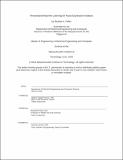| dc.contributor.advisor | Ognjen (Oggi) Rudovic and Rosalind Picard. | en_US |
| dc.contributor.author | Feffer, Michael A. (Michael Anthony) | en_US |
| dc.contributor.other | Massachusetts Institute of Technology. Department of Electrical Engineering and Computer Science. | en_US |
| dc.date.accessioned | 2018-12-18T19:49:00Z | |
| dc.date.available | 2018-12-18T19:49:00Z | |
| dc.date.copyright | 2018 | en_US |
| dc.date.issued | 2018 | en_US |
| dc.identifier.uri | http://hdl.handle.net/1721.1/119763 | |
| dc.description | Thesis: M. Eng., Massachusetts Institute of Technology, Department of Electrical Engineering and Computer Science, 2018. | en_US |
| dc.description | This electronic version was submitted by the student author. The certified thesis is available in the Institute Archives and Special Collections. | en_US |
| dc.description | Cataloged from student-submitted PDF version of thesis. | en_US |
| dc.description | Includes bibliographical references (pages 35-36). | en_US |
| dc.description.abstract | For this MEng Thesis Project, I investigated the personalization of deep convolutional networks for facial expression analysis. While prior work focused on population-based ("one-size-fits-all") models for prediction of affective states (valence/arousal), I constructed personalized versions of these models to improve upon state-of-the-art general models through solving a domain adaptation problem. This was done by starting with pre-trained deep models for face analysis and fine-tuning the last layers to specific subjects or subpopulations. For prediction, a "mixture of experts" (MoE) solution was employed to select the proper outputs based on the given input. The research questions answered in this project are: (1) What are the effects of model personalization on the estimation of valence and arousal from faces? (2) What is the amount of (un)supervised data needed to reach a target performance? Models produced in this research provide the foundation of a novel tool for personalized real-time estimation of target metrics. | en_US |
| dc.description.statementofresponsibility | by Michael A. Feffer. | en_US |
| dc.format.extent | 37 pages | en_US |
| dc.language.iso | eng | en_US |
| dc.publisher | Massachusetts Institute of Technology | en_US |
| dc.rights | MIT theses are protected by copyright. They may be viewed, downloaded, or printed from this source but further reproduction or distribution in any format is prohibited without written permission. | en_US |
| dc.rights.uri | http://dspace.mit.edu/handle/1721.1/7582 | en_US |
| dc.subject | Electrical Engineering and Computer Science. | en_US |
| dc.title | Personalized machine learning for facial expression analysis | en_US |
| dc.type | Thesis | en_US |
| dc.description.degree | M. Eng. | en_US |
| dc.contributor.department | Massachusetts Institute of Technology. Department of Electrical Engineering and Computer Science | |
| dc.identifier.oclc | 1078783584 | en_US |
